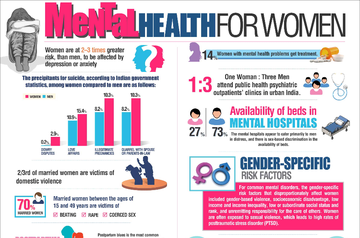Why Is Women’s Mental Health Important For Society?
In the contemporary world, women have had to struggle to get their due position in the workforce and to have their role within homes be recognised as contributing to society in a productive manner. They have been caregivers for a large part of human history. This significant contribution to society has been trivialised since the Industrial Age, as economies have become increasingly market oriented. In the past century or so, women have entered the workforce and now find that they have to put in far more effort than their male colleagues, irrespective of capabilities.
Studies on women workers have often shown that in spite of working as diligently and intelligently as their male counterparts, they are almost never given equal credit or compensation. Quite often, this leaves women struggling for approval, recognition, and for even a simple word of acknowledgement, let alone praise. At the same time women are often socialised into being uncomplaining and compliant. They are also made to feel guilty about everything, accept responsibility for all things that go wrong; and engage in self-blame for all the ills that may befall any one in their vicinity. A recent article in The Wall Street Journal (dated September 27, 2016) highlights the findings of a study conducted by LeanIn.Org and McKinsey & Co. that surveyed 34,000 women and men across 132 global companies. Findings suggest that for the same level of training and work performed, women get fewer promotions, access to top leaders, feel less rewarded for merit and less confident compared to their male counterparts. Which is unfortunate, since the idea is not for men and women to compete, but to cooperate and be able to collaborate. After all, that is the key to a more happy and productive society. It is not to put women and men against each other, but to ensure that one is not emotionally encumbered and under continued stress.
However, many women find themselves juggling responsibilities at home and outside, adding to the workload and emotional burden. Women who are working in the domestic realm are often seen as economically and socially “unproductive”. This is because what today’s world understands as professionalism is often the ability to be able to work outside the household, which means that all domestic responsibilities including giving birth and rearing children are not viewed as “professional”. At the same time, at home a woman is expected to continue fulfilling her “natural” duties as a mother and wife, and is put under extra scrutiny when she chooses to work outside the house. In addition, there are evils, such as gender-based violence across the world that find many women being mistreated physically and emotionally, leaving deep scars that significantly impact their emotional wellbeing.
It is no wonder that women can end up feeling stressed, depressed, and having a sense of being lost and persecuted. These negative mental states – especially the ones of guilt and self-blame for everything gone wrong and for not being able to perform every task to perfection – lead to enormous mental and emotional pressures that can even manifest into physical illnesses, such as cardiac problems, diabetes and chronic back pain, to name a few. Many women stop taking care of themselves and neglect their health and nutrition, which has negative consequences for them, as well as all those lives for whom they are responsible. Additionally, since a woman’s mental health also impacts her performance in the public sector, it is possible that much is lost to society in terms of productive labour. As mentioned earlier, women are about fifty percent of the world’s population and hence their underperformance or lack of opportunity to express themselves may result in a huge loss to global productivity. Lack of recognition of women’s mental health is, thus, not just confined to women who suffer but impacts the health of society as a whole.
The suffering of a woman who is not in optimum mental and physical condition isn’t just her own, it becomes extended to family and society. An emotionally exhausted and stressed mother is not the best environment for a child. It is often seen that children bear the brunt of anger and frustration of a mother who is physically tired and mentally incapacitated, as they are the most vulnerable. Since a woman is often unable to protest to people like her boss or her husband who are in positions of power, she may turn to those under her care. The elderly and the young ones in the family often become impacted in such a situation.
Hence, as society it becomes our duty to pledge to ensure that women’s emotional wellbeing is not neglected, since it is not just lost productivity, but a loss of happiness, a loss of lives, a loss of those we love and cherish. This is not just relevant for women to understand, but for men too, as this impacts daily life of everyone in the family. Hence, it is important to address women’s emotional wellbeing as that way we ensure we have a healthy society and future.
















